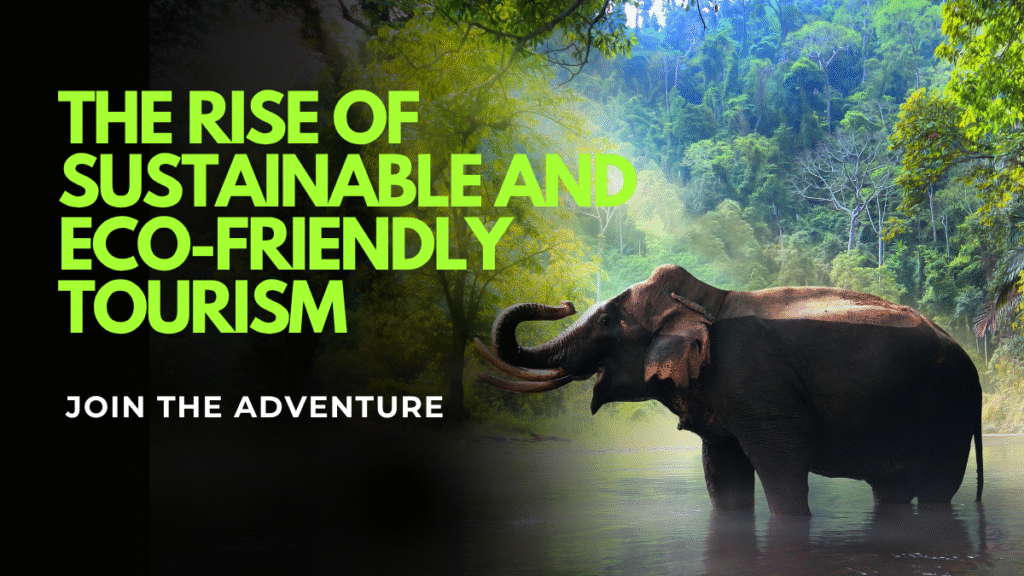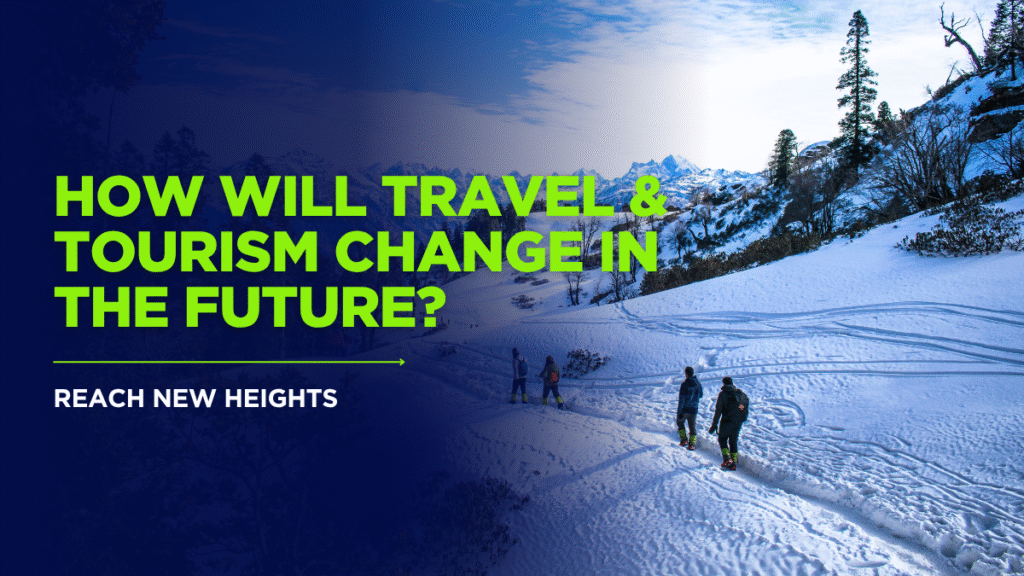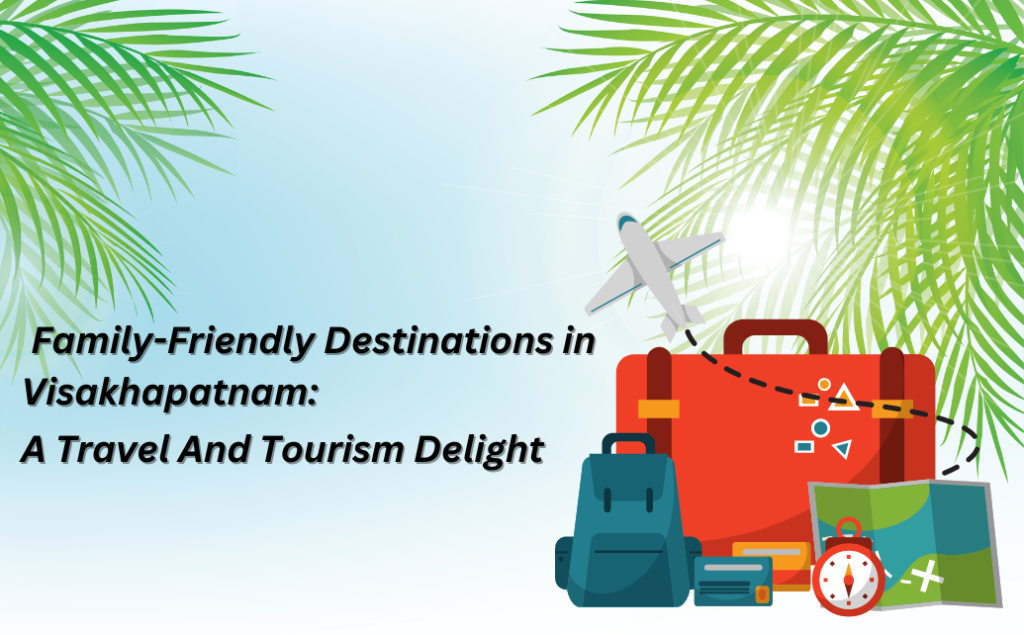Travel and tourism have always been changing industries, in sync with technological innovations, social changes, and world events. As we progress towards 2025 and beyond, the industry teeters on the edge of a transformative phase fueled by innovation, sustainability, and changing traveler behaviors. This blog explores how travel and tourism will change, from technological advancements, sustainable shifts, emerging activities, and the effects of global events, and how this can prepare travelers and industry professionals for a thrilling future.
Why the future of travel and tourism matters
It is important to understand the future of travel and tourism for many reasons. For tourists, it influences expectations and choices, from safety measures and travel experiences to sustainability and technology. For tourism industry players, it provides information on emerging trends and opportunities important in planning, investment, and innovation. Moreover, a future sustainable, inclusive, and tech-friendly tourism sector can make a significant contribution to economic development and environmental conservation.
In an ever-evolving world—where climate change, geo-political re-alignment, and global health crises shape mobility—the capacity to innovate and adapt will drive the sector’s resilience and dynamism. Keeping that in view, let’s examine the key shifts redefining the future of travel and tourism.
1. Technology Innovations Redesigning Travel
Personalized travel planning with artificial intelligence
Artificial intelligence (AI) is transforming how people plan and enjoy journeys. AI machines scan user interests, social media profiles, browsing habits, and previous bookings to create very customized travel itineraries. Whether suggesting far-flung locations, recommending activity, or coordinating travel logistics, AI simplifies the planning process and tailors it to the individual’s needs.
This evolution signifies a shift from generic packages toward hyper-personalized journeys that meet individual tastes, budgets, and lifestyles. For instance, AI-driven chatbots and virtual assistants now handle booking inquiries, provide real-time updates, and address traveler concerns, enhancing overall customer experiences.
Virtual and augmented reality experiences
Virtual Reality (VR) and Augmented Reality (AR) are creating new avenues for travel experiences, even prior to the traveler’s departure from home. Think of visiting the Louvre in your living room or going on a virtual safari in Africa. These immersive technologies assist travelers in previewing destinations, planning activities, and generating interest.
In tourism promotion, VR provides immersive virtual visits that stimulate potential tourists’ decision-making, while AR-infused visits to destinations layer information and interactivity onto sightseeing, making it an immersive learning experience.
Autonomous transport and intelligent airports
Autonomous cars, drones, and intelligent infrastructure will change travel logistics in the future. Self-driving taxis and shuttles are being piloted in cities globally, cutting transportation expenses and improving safety.
Smart airports make use of IoT sensors, facial recognition, automated check-in processes, and baggage handling systems to optimize passenger flow, decrease waiting times, and enhance overall efficiency. These technologies help ensure a hassle-free travel experience from the point of departure to arrival.
2. The Emergence of Sustainable and Eco-Friendly Tourism

Increasing popularity of green travel choices
There are more eco-aware tourists looking for green travel that leaves a smaller ecological footprint. They are selecting environmentally friendly hotels, patronizing local economies, and utilizing reduced-carbon transportation.
Hotels, tour operators, and even airlines are going green—adopting renewable energy sources, water conservation programs, and waste minimization—catering to this market demand.
Certification schemes such as Green Globe or LEED have an impact on consumer decisions and ensure sustainable tourism.
Community-based and responsible tourism
The future belongs to community-based tourism models that focus on local returns and cultural conservation. Tourists are increasingly aware of their environmental and social footprint, opting for experiences that enhance the lives of host communities instead of exploiting them.
Experiences like eco-lodges, homestays at villages, and community-led conservation projects promote genuine connections and sustainable growth. Sustainable tourism also includes observing cultural values, promoting local economies, and minimizing overtourism.
Impact of climate change on travel destinations
Climate change offers tourism both opportunities and challenges. Sea-level rise endangers island nations and coastal resorts, and the industry must be innovative in climate adaptation and resilient infrastructure.
At the same time, there are some areas that are embracing eco-tourism and conservation measures to conserve their natural resources, and eco-conscious tourists are visiting them. Green tourism practices are essential in ensuring the long-term sustainability of popular places and keeping them as vibrant places of interest.
3. New Travel Experiences and Trends
Space tourism and ultra-luxury experiences
Space tourism is making the leap from science fiction to reality, with SpaceX, Blue Origin, and Virgin Galactic selling suborbital flights to adventure seekers and ultra-high-net-worth clients. While still pricey and limited, space travel is slowly becoming more affordable, a growing niche.
This frontier offers new experiences, including weightless travel, moon travel, or even Mars opportunities in the far-off future. With developments in technology, space tourism is likely to become more affordable, driving economic growth and innovation in the luxury tourism industry.
Remote work and digital nomadism are driving travel
The COVID-19 pandemic accelerated remote work, leading to a surge in digital nomadism. Travelers now seek destinations that offer reliable internet, coworking spaces, and a welcoming community.
This trend is inspiring the development of “nomad-friendly” cities with affordable living costs, quality amenities, and vibrant cultures. It also encourages longer stays and mid-term rentals, transforming traditional tourism into more flexible, lifestyle-oriented travel.
Experiential and immersive travel
Subsequent travelers seek significant, genuine experiences rather than sightseeing. These encompass cultural immersions, food tours, adventure sports, and nature trekking—experiences that result in storied moments and intimate connections.
AR and VR add these experiences, making them virtual guides, interactive stories, or augmented overlays that enhance comprehension and engagement.
4. The Impact of Global Events
How pandemics redefine safety and hygiene conventions
Pandemics like COVID-19 have irrevocably changed safety and sanitation standards. Improved cleaning procedures, contactless check-in, health pass policies, and health screenings are now standard travel fare.
Technology is used to ensure safety in the form of contactless payments, digital health passports, and real-time health notifications. The industry needs to be responsive, flexible, and transparent to reinstate traveler confidence and safety.
Geopolitical shifts and visa policies on travel movements
Geopolitical change can have a profound impact on travel trends, changing visa policies, border regulations, and foreign relations. This can result in tighter restrictions in some destinations and the chance of others.
Holiday spots with open visa policies and political stability will most probably boom, while travelers need to remain aware of changing policy to plan safely.
5. The Future Traveler Profile
Millennials and Gen Z travel expectations
Younger generations value experiences, authenticity, sustainability, and social influence. They demand personalized, Instagram-ready moments and hassle-free digital interactions.
They are equally more mindful consumers, prioritizing eco-friendly, ethical practices, and values-based brands. They like flexible, bespoke travel arrangements and are receptive to offbeat destinations.
Personalized and flexible travel arrangements
The future is for travelers who yearn for flexibility and personalized experiences. Dynamic pricing, real-time information, and AI-enabled recommendations will make it possible to have completely customizable itineraries, last-minute changes, and authentic experiences.
Tech-savvy and socially responsible travelers
Travelers today are digital natives, using smartphones, social media, and feedback to inform decisions. They prize transparency, authenticity, and eco-responsibility, making the future of tourism more inclusive and sustainable.
Conclusion
Preparing for the travel future: What travelers and industry stakeholders can anticipate
The travel and tourism future is dynamic, creative, and multifaceted. Embedding advanced technology, eco-friendly practices, and changing traveler trends will be crucial to success.
Travelers can learn to adapt to flexibility, sustainability, and technological aid to maximize their travels. Industry stakeholders will have to be ahead of the curve—embracing digital shift, going green, and focusing on safety and personalization.
As we look to 2025 and beyond, those who embrace change and innovate ahead of the curve will open up new and thrilling possibilities for how travel continues to be a source of happiness, exploration, and unification for generations.




Progress Pathway – Very practical, explains how structured steps create consistent forward movement.
Clarity Map – Very practical advice, shows how clear intentions support consistent action.
Priority Tracker – Helpful content, gives clear guidance for staying productive and organized.
Натяжные потолки скрывают проводку, трещины и неровности без грязных работ, помогает быстро освежить отделку без демонтажа штукатурки, а двухуровневая конструкция подчеркивает стиль; можно заранее спланировать скрытый карниз и подсветку по проекту – https://potolki-decarat.ru/
טהורה. אתה עלול למצוא את זה מוזר, אבל זה תנאי שאני בהחלט מילא במשך כל השנים האלה. בעלי הוא אדם אכפתי ואוהב, ויש לי חיבה עדינה ידועה אליו. וברגע שהבנתי שההתאהבות הבאה עלולה להפוך סליחה. הוא נישק את רגליה של איזבלה והבטיח להיות תמיד שם בשבילה. כך ריצ ‘ רד הפך לבעלה של איזבלה. הם חיו באושר ועושר, ואהבתם הייתה חזקה יותר מכל המבחנים. יום אחד, אביר בשם הרולד אשם wildvintageporn.com
Looked at 45678bet. Seems like a reliable option. Worth a look if you’ve been searching for a new platform. 45678bet
Checked out ax888. Not a bad little site, the games loaded quickly and support seemed responsive. ax888
bb88bet came through with a respectable set of choices. Definitely worth a peek if you need something new. bb88bet
Hello! This is kind of off topic but I need some guidance from an established blog. Is it very difficult to set up your own blog? I’m not very techincal but I can figure things out pretty fast. I’m thinking about making my own but I’m not sure where to begin. Do you have any points or suggestions? Appreciate it
https://renault-club.kiev.ua/yak-vstanovyty-bi-led-lampy-h4-bez-pomylok.html
Привет всем! Сегодня затронем тему — рёв на скорости. Ценишь время — обращайся к специалистам: https://shumoizolyaciya-avtomobilej.ru . Суть в том, что шумка одних дверей — это полдела. На данный момент основные резонаторы — днище и крыша. Как это работает? В дождь оцениваешь откуда идёт звук. Опять же, хочешь своими силами: готовишь, клеишь вибру, прикатываешь тщательно. Резюмируем: эффект гарантирован.
Здравствуйте дорогие друзья! Разберём самые актуальные — сравнение кровельных материалов. Хочешь без головной боли — обратись: монтаж мембранной кровли. Суть здесь в чем: битумка трескается. На практике, ПВХ мембрана — выдерживают перепады температур. Ну вот постоянные морозы-оттепели — так вот мембрана не теряет свойств. Общие рекомендации: выбор производителя. Что в итоге: экономия в перспективе.
sona bet